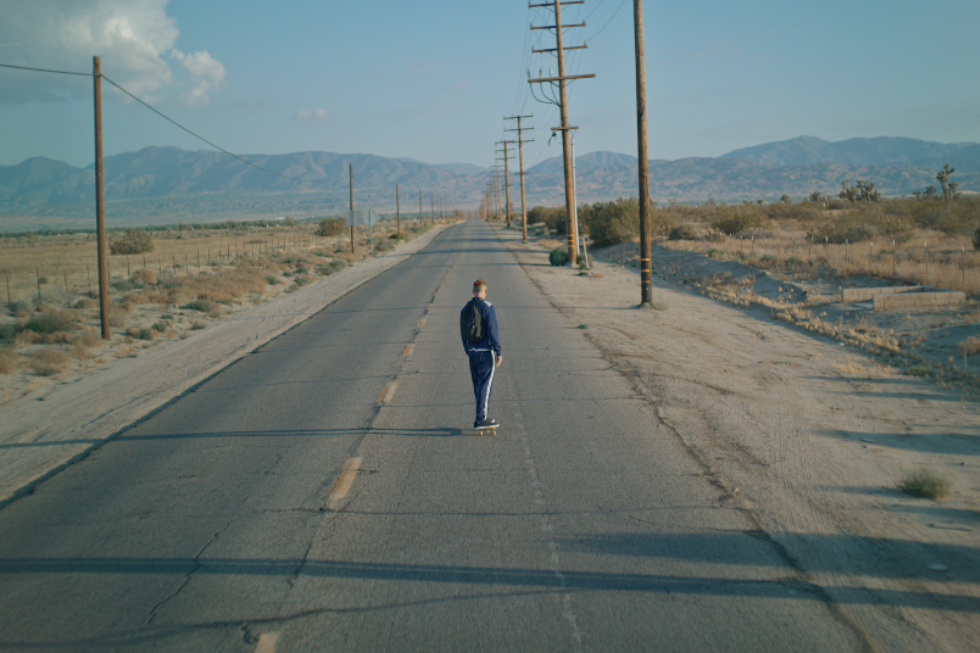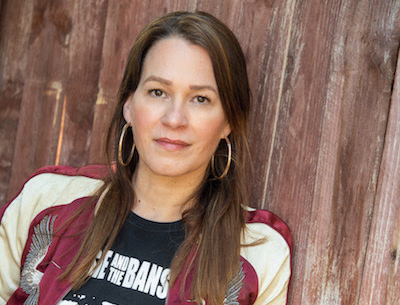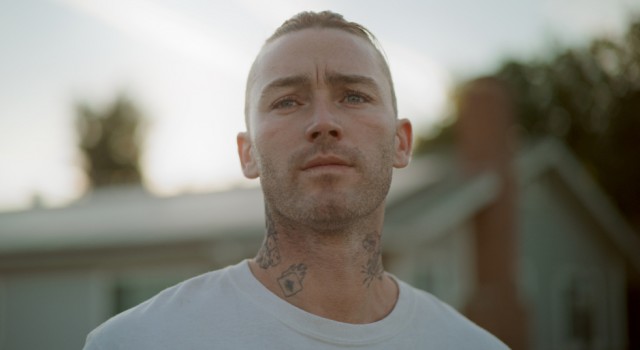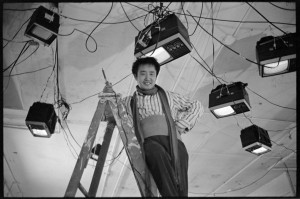“The space allotted to me as an actor was too small” – The Big Interview: Franka Potente

She burst onto cinema screens in memorable fashion. Today, though, on the eve of the release of her first feature film, Franka Potente is happier behind the camera, finds Mike Pinnington…
If I said the name Franka Potente to you, it might conjure an image of her, flame-haired, beating the streets of Berlin as the titular character of 1998’s frenetic thriller, Run Lola Run. Or, perhaps, a little more recently, put you in mind of the ill-fated partner of Jason Bourne (The Bourne Identity, The Bourne Supremacy). What you wouldn’t necessarily think of, though, is Potente sat in the director’s chair. But this could all be about to change, as later this month her first feature film, Home, is due for digital release.
I spoke with Potente recently over Zoom, about swapping acting for greater creative control, her inspirations, and the film with which she announces her arrival as director. A world away from the frenzied roles with which we readily associate her, Home follows Marvin (played understatedly by Jake McLaughlin), recently released from a long stint in prison for murder, returning home to care for his ailing mother (the ever-brilliant Kathy Bates). No straightforward tale of redemption, Home deals with the sometimes crushing realities of small lives lived in a left-behind American town. I first asked German-born Potente about the decision-making process behind the film’s setting and subject.
“I think it only worked because I wrote the script as well,” she begins. “[Had it been] an American writer, I think it would have been very different.” It works, she says, because “you start with the little details – details that are not necessarily American, but human. That’s what writing is for me. I’m not sitting there thinking ‘oh, I’m going to write a story about making a socio-economic comment about “American white trash”’ or something, you know? I sit there thinking what would happen if someone was frozen at the age of 20.”
Released back into the world, as Potente says, “a man now”, Marvin has his freedom, but also must face the challenges of returning to a small community that hasn’t forgotten his crime – far from it. “What does that mean?” asks Potente. “In the environment that he’s returning to – the kind of masculinity that’s expected? But here he is, raw and vulnerable. What does that look like?” Here, the film excels, as the multiplicity of meanings suggested by its title are explored to interrogate what ‘home’ really is.

We talk about the film’s set-up. “How is this not gonna be bleak?” Potente asks rhetorically. But, she says, “I have that feeling when I see movies that start, y’know, in a millionaire environment. I’m like ‘oh my god, I don’t think I can watch this’. But once a story allows you in to its very personal, subjective point of view, it’s no longer in that moment a story about only America, only this or only that, you know what I mean?
“And, of course, when you’ve finished the film, and you step back, it is also a comment about [the need for] prison reform, how undervalued these small communities are, and how we – as humans – are not letting other people in.”
One of Potente’s masterstrokes with Home is what it doesn’t say. We never learn, for instance, Marvin’s motive for murder or, in very much detail, about his victim – simply that she was a grandmother and, growing up, had been friends with his mother. Did she wrestle with that, I ask; not giving us too much versus letting us in entirely on that aspect of the story?
“I didn’t want the whodunnit. I didn’t want that to overshadow the experience the audience had. Sometimes when we’re given an exact reason, it eliminates a lot of possible other feelings we might have, because then we start to estimate: ‘well in that case’. We’re considering our forgiveness, right, measured against the deed? And I just didn’t want that.” What the director is asking the audience to do instead, she says, is “to consider your forgiveness without knowing exactly what happened, because I do think that a lot of these things that happen at a young age… there are reasons.”

In Marvin’s case, “his brother killed himself, he never had an outlet to deal with it, there’s a lot of bottled-up anger and anxiety and no work, and all these things, y’know? The loss of the father. All these things kind of led to what happened, but I just didn’t want to be smarter than the story in a way, and give you a reason, like a way out, so to speak. You can’t really explain these things, sometimes, as much as you’d wish to. Or understand them.”
I wanted to know more about Potente’s journey to the director’s chair. When did it become an aspiration that needed to be satisfied? “I think I just felt over time – I’ve been an actor for over 20 years – like, I wanna control, ‘creatively be part of’ sounds better (!), a bigger space in movie making. I felt like the space allotted to me as an actor was too small.
“As an actor you have so many experiences where you feel like: ‘I could do a better job, actually! What this director’s telling me and my colleagues doesn’t make any sense’, or ‘it’s not really leading me to a better experience’, which of course is very arrogant, I’m aware of that! But we all have these experiences when you’re like [head in hands] ‘oh my god… huh!?’ y’know?
“Maybe, to say it more positively, ‘I would like to try that too!’ And I like when people come together, and they have the same focus, but everybody brings a different talent to it – I think that’s awesome. I thrive in an environment like that, and I like to be the person that keeps the overview, and who is encouraging, and connects – even on a micro-level. I really, really enjoy that. I hope I get another chance to do that!”
Home, which rarely feels like the work of a first-time director, was originally completed in 2020, and Potente says that she has written “a couple of scripts since.” Can she tell us anything about them, I ask. She smiles.
“I have another underdog story, [about] a woman; similar feel, but different.” There is, she tells me, “a little bit more humour than in Home.” But, musing on how things may or may not transpire given present circumstances, her anticipation is also somewhat tempered. “I’ll see what happens. It’s hard to know, especially with the pandemic still going on and everything – my god, the last two years! – like, what the landscape of movies and storytelling will be like. It’s really hard to know what people are longing for, so we’ll see.”
One thing she does know is that “We can’t close it [cinema] all down, you know? [It] is so important, especially in these times.”
Speaking of the importance of cinema: what have been the inspirations along the way? “I like all sorts of different movies. I’m not highbrow in the sense that ‘I’m only gonna watch Kurosawa’! No, I’ll watch Meet the Parents, too, and I love it. I’ve watched it, like, five times!” In relation to her own brand of filmmaking, though, she says that “I think when you see [it], like, Andrea Arnold is an inspiration. The Dardenne brothers, I love. Those are probably two – especially visually – that I would name.”
Perhaps not wanting to be drawn into making too many comparisons so early in her directing career, discussion turns back to more general enjoyment. “I love Licorice Pizza,” she says, “the new Paul Thomas Anderson film – it’s wonderful, fresh, even though it’s nostalgic. He’s really great.” And “I love, especially, the early Spike Jonze; his playfulness, it’s just wonderful.” Then there’s “Sofia Coppola’s films – being very specific, Marie-Antoinette; I think that’s a movie that’s underrated. It’s fun and fresh and contemporary.
“I like things that feel contemporary, for lack of a better word. I don’t prioritise things that feel kind of contrived or stiff. I like hand-held camera versus gliding camera on tracks – to me it’s a little bit safe, y’know? But then you think of the great Scorsese films, and you’re like ‘what am I saying!?’”
Finally, I can’t help but ask about her breakout movie, Run Lola Run. It remains iconic; full of excitement and dynamism provided, in no small part, by Potente herself. Whenever you see it, I tentatively ask, what goes through your mind when you look at this young woman running, in her DMs, and self-confessed two pack a day habit? Is it with a sense of awe?
“How was I doing that!?” she laughs. “It wasn’t easy! The weird thing is, that, 20 something years later, I think I’m probably in better physical condition in a strange way than I was [then]. I like seeing that. It’s like seeing an old friend – it has been such a big part of my life. And the weird thing is, I think I appreciate it more now than in the craziness of it. I think sometimes, when I was younger, and all this stuff happened with the movie, it was too abstract for me, and stressful too.”
What about today? “Now? I’m older, I have kids, they’ve seen the movie and they’re like [mimicking a childlike shrug] ‘yeah, it’s alright’.” Then, she adds, as if surprised at the realisation: “Amongst certain people, it’s still kind of a cool ticket. They’re like [affecting an impressed voice] ‘you did Run Lola Run’ and I’m like ‘yeah, y’know’. It’s kinda fun to have been part of something like that, for sure. I realise that, now, I appreciate it a little bit more than when I was in the middle of it, but that’s probably normal.”
Mike Pinnington
Home is available on digital platforms from 24 January
Franka Potente Image credit : Welkino Foto © Vera Anderson





